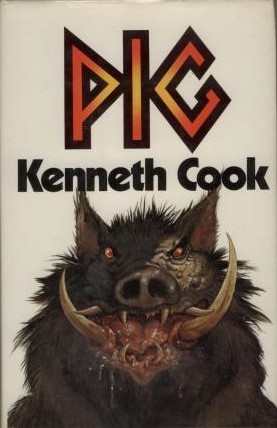 By KENNETH COOK (Schwartz Publishing Group; 1980)
By KENNETH COOK (Schwartz Publishing Group; 1980)
Nobody had a better grasp of life in rural Australia than the late Kenneth Cook, and that knowledge is put to good use in the harsh and brutal PIG. It’s essentially a more intelligent and realistic—though not necessarily better—variant on the Aussie horror flick RAZORBACK (1984), pivoting on a mutant pig loose in the Australian outback.
The RAZORBACK comparison does this novel no favors. The film, after all, is uniformly trashy and exploitive, elements that frankly could have benefited PIG. Its story is nothing to shout about, being a no-frills variant on the monster hunt narrative that informed JAWS and MOBY DICK, and indeed stretches back to BEOWULF and beyond. This befits PIG’S underlying message concerning the real-life dangers posed by the alien species invading Australia, including pigs, cane toads (see the famous documentary of that title) and other critters, although that message is thankfully never laid on too thickly.
Mutant creatures were never Cook’s forte, but in PIG he acquits himself reasonably well by putting his descriptive talents to good use. His characterizations are also strong, with the protagonist, a conservationist named Allen Treval, being a well-modulated bundle of contradictions. Treval claims to care deeply about Australia’s wildlife yet callously kills quite a few animals over the course of the novel. Allen is initially looking to capture the titular mutant pig and bring it back to Sydney for study, but he eventually grows determined to simply kill the thing. This entails a trek into the filthy swampland where the creature resides, with Allen’s son Michael and an attractive pilot named Anne along for the ride.
In relating this bleak tale Cook makes at least one sizeable mistake. This is to say he constantly tries to justify the pig’s Godzilla-like powers (I lost track of how many arguments the protagonists have about whether the creature is “just” a pig) without ever bothering to explain them. A good pulp novelist would have provided a simple radioactive contamination or scientific mutation rationale, but Kenneth Cook was an A-list author working on grade-B material. There’s nothing wrong with that, of course, but I feel that when writing such fare one should embrace its inherent trashiness rather than pretend to be above it.
